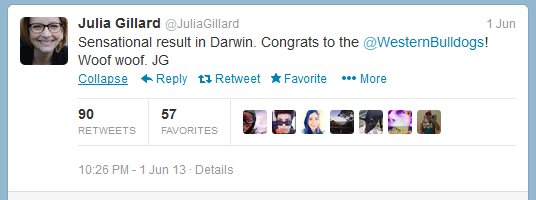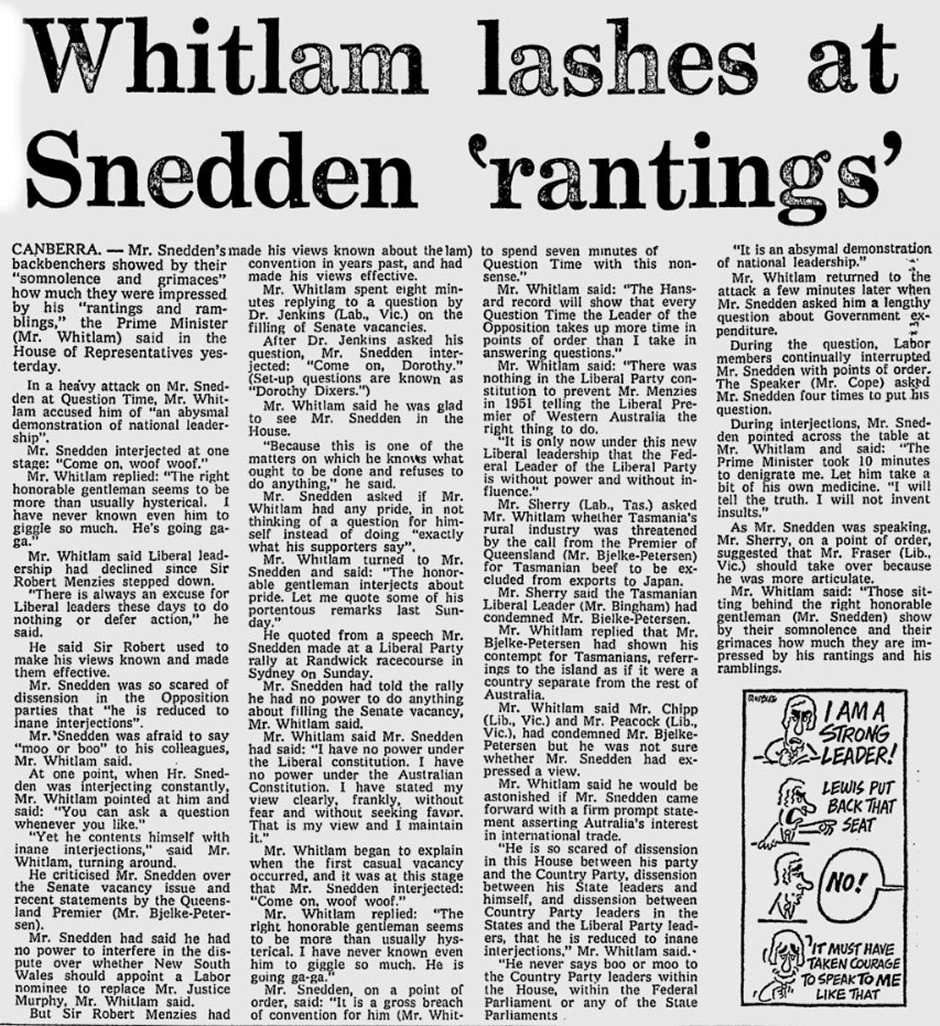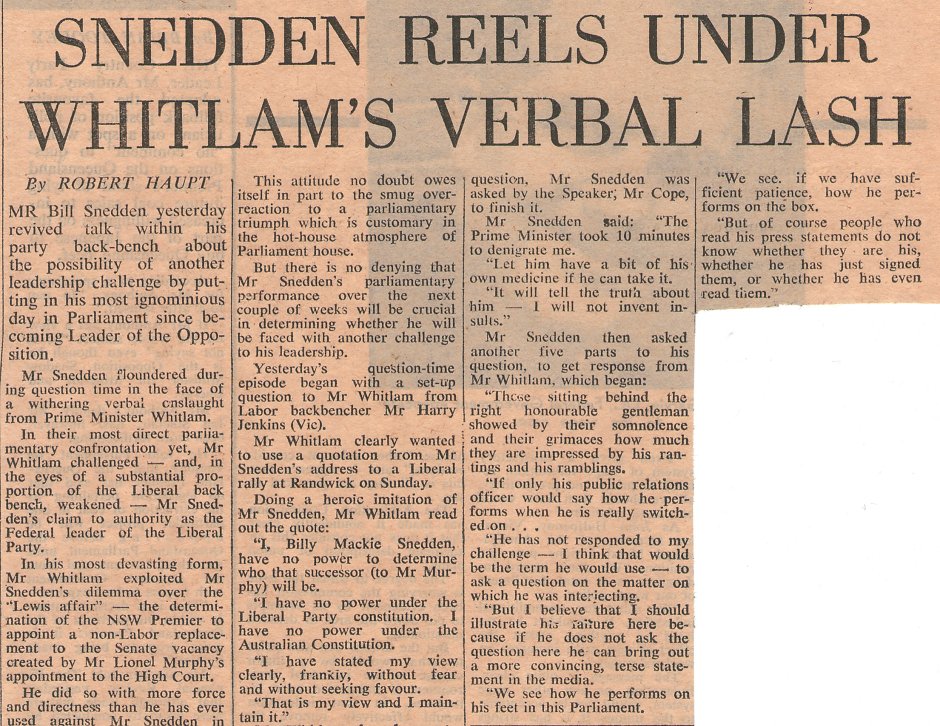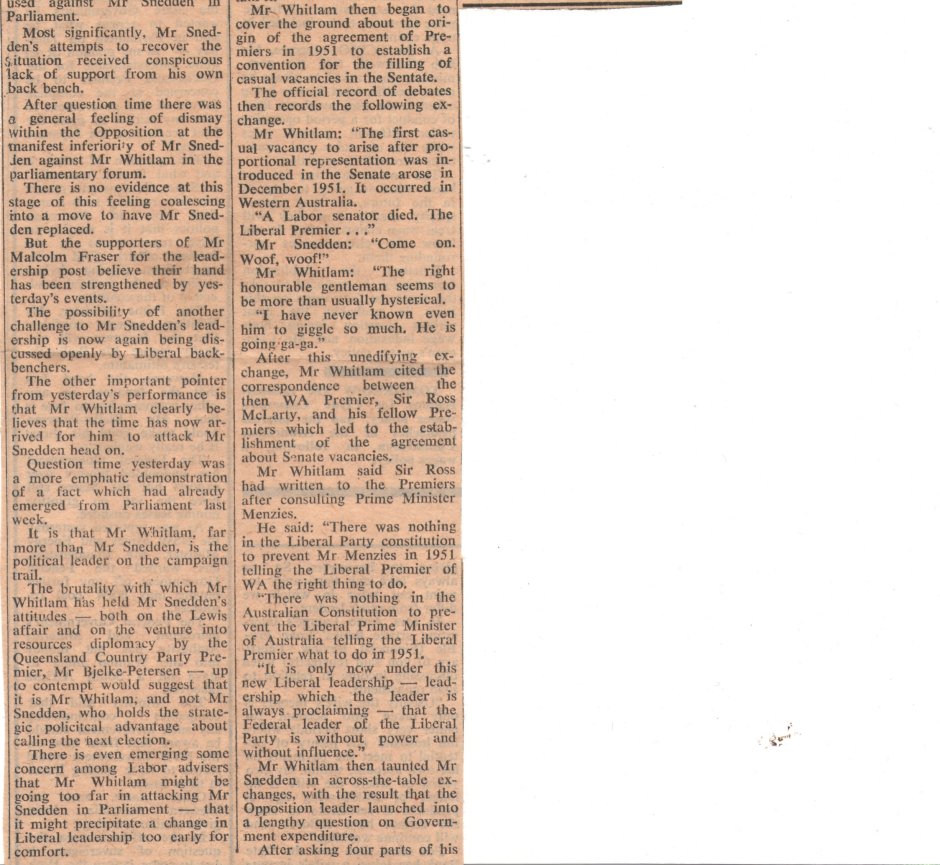Last updated on November 22, 2023
I can’t resist it. Whenever I hear someone say “woof woof”, I always think of a famous exchange between Gough Whitlam and Billy Snedden in 1975.
Today’s email from Crikey alerted me to this tweet from Prime Minister Julia Gillard on Saturday:

At least Gillard was only expressing her delight at the 9-point victory by the Western Bulldogs over Port Adelaide.
In the House of Representatives on February 19, 1975, however, the same words were uttered by the Liberal Opposition Leader, Billy Snedden. They came during a discussion of one of the most contentious constitutional issues of the Whitlam years. Snedden was ridiculed by Whitlam and the incident contributed to Liberal unease over Snedden’s leadership. He was replaced by Malcolm Fraser a couple of weeks later.
The incident occurred during a response by Whitlam to a question from Harry Jenkins, the member for Scullin and father of the current member for Scullin, Harry Jenkins junior.
Jenkins asked about the filling of casual Senate vacancies, an issue of some importance in those days because the conservative governments of Joh Bjelke-Petersen in Queensland and Tom Lewis in New South Wales had broken with convention by refusing to appoint Labor replacements to positions vacated by Labor senators.
Following Whitlam’s appointment of the government’s Senate leader, Lionel Murphy, to the High Court, just a few weeks before this encounter in the House, the Lewis government announced that the independent Mayor of Albury, Cleaver Bunton, would fill the vacancy.
Later in the year, following the death of Queensland Labor Senator Bert Milliner, the Bjelke-Petersen government refused to accept Labor’s nomination (a gentleman by the name of Mal Colston, but that’s another story) and instead appointed Albert Patrick Field.
The effect of these two nominations was to alter the balance of power in the Senate and enable the Opposition to block the Budget, precipitating Whitlam’s dismissal by Governor-General Sir John Kerr on November 11, 1975.
Even Malcolm Fraser was aware of the dangerous democratic implications of state governments playing fast and loose with Senate replacements. He held a referendum in 1977 which amended Section 15 of the Constitution to ensure that replacements came from the same party as the deceased or resigned senator.
The Hansard transcript of the exchange between Whitlam and Snedden is shown below, as are two newspaper articles from The Age and the Australian Financial Review on February 20, 1975.
Hansard transcript of Question Time in the House of Representatives on February 19, 1975.
Dr JENKINS—Can the Prime Minister provide the House with any further information on the issue of the proper and democratic manner in which casual Senate vacancies are filled?
Mr Snedden—Come on Dorothy.
Mr WHITLAM— I am glad that the Leader of the Opposition is here today because this is one of the matters, on which he knows what ought to be done and refuses to do anything. Since last week—
Mr Snedden—Has not the honourable member any pride that he can think of a question for himself instead of doing just exactly what his leader says?
Mr WHITLAM-The right honourable gentleman interjects about pride. Let me quote some of his portentous remarks of last Sunday. He said: “I, Billy Mackie Snedden, have no power to determine who that successor will be. I have no power under the Liberal Party constitution. I have no power under the Australian Constitution. I have stated my view clearly, frankly, without fear and without seeking favour. That is my view and I maintain it”. But let me go back to what the first leader, the founder, of the Liberal Party, did in this matter.
Mr Nixon— I rise on a point of order, Mr Speaker. The Leader of the Opposition also pointed out honestly what are the facts of the situation, which is more than the Prime Minister did on television on Sunday night.
Mr SPEAKER-Order! The honourable member for Gippsland will resume his seat. I warn honourable members against taking frivolous points of order. The honourable member for Gippsland knows that that is a frivolous point of order. The honourable member for Gippsland will remain silent.
Mr WHITLAM—The first casual vacancy to arise after proportional representation was introduced in the Senate arose in December 1951. It occurred in Western Australia. A Labor senator died. The Liberal Premier—
Mr Snedden—Come on. Woof, woof!
Mr SPEAKER-Order! Interjections will cease or I will take the appropriate action. That applies to every member of the House.
Mr WHITLAM-The right honourable gentleman seems to be more than usually hysterical. I have never known even him to giggle so much. He is going ga-ga.
Mr SPEAKER-Order! The Prime Minister will address the Chair.
Mr WHITLAM-Let me reiterate: The first casual vacancy to occur after proportional representation was introduced in the Senate occurred in December 1951. It occurred through the death of a Labor senator. The Premier of Western AustraUa at the time was a Liberal. The Liberal and Country League executive met shortly afterwards and carried a resolution agreeing to the appointment of an LCL candidate. The Premier, however, got the executive to agree that he should first consult the Liberal Prime Minister, Mr Menzies. He wrote to Mr Menzies on 20 December. Mr Menzies obviously gave him his view and as a result—
Mr Nixon— I rise to a point of order, Mr Speaker. This is a clear abuse of the privileges of question time by the Prime Minister. Why does he not make a statement and let the subject be debated?
Mr SPEAKER-Order! No point of order is involved.
Mr Nixon— A point of order is involved. It is a clear abuse of privilege.
Mr SPEAKER-Order! No point of order is involved. The honourable member for Gippsland will resume his seat.
Report in The Age, February 20, 1975:
Article by Robert Haupt, Australian Financial Review, February 20, 1975:



